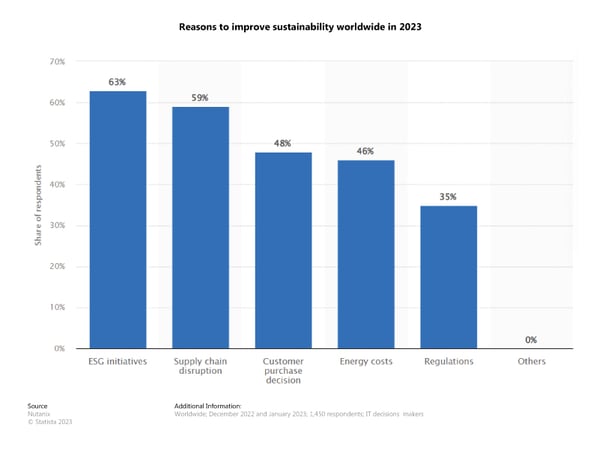In a present where the preservation of resources is the priority, the sustainable supply chain emerges as an essential element for companies aiming to reduce their environmental, economic and social impact and adopt a circular business model.
This strategy introduces eco-efficient practices in every part of the production and distribution process, and it stands out not only as an ethical choice, but also as a competitive factor that steers companies toward lasting and conscious success.
In this article, we will examine in detail the peculiarities of a sustainable supply chain, the benefits it can offer companies, and the technologies needed to implement it.
Sustainable supply chain: what it's all about.
Sustainable supply chain encapsulates an operating model that integrates ethical practices at every node of the supply chain. It is not limited to simply reducing the ecological impact of sourcing, production and distribution activities, but redefines the production process in a broad sense, including selecting suppliers with responsible conduct, using renewable resources, reducing waste and extending the life cycle of products and materials. A sustainable supply chain approach also involves assessing and optimizing business activities from a corporate responsibility perspective, ensuring that every step-from product design to delivery and beyond-positively contributes to environmental and social well-being. A sustainable supply chain thus lays the foundation for long-term resilience, a marked ethical footprint and a sustainable competitive advantage.

Why it has become a necessity
In 2023, there are multiple reasons for a renewed commitment to sustainability, including in the supply chain.
Driving the change are corporate initiatives related to environmental, social, and governance (ESG), followed by trying to solve supply chain disruption and simplify long hardware supply cycles, identified as the main drivers by 63 percent and 59 percent of companies, respectively.

(Source: Statista)
Supply chain disruptions represent any obstacle to the normal flow of goods and services caused by factors such as natural disasters, production problems, logistical failures, or economic turmoil. Sustainable supply chains are, in particular, an answer to the disruption problem because they involve the adoption of responsible and resilient management practices, such as using renewable resources, reducing waste, and selecting ethical suppliers. These approaches not only reduce environmental impact, but also increase the company's ability to adapt quickly to unforeseen changes, minimizing downtime and ensuring more effective business continuity in crisis situations.
Sustainable supply chain: what benefits it brings
Adopting a sustainable supply chain proves to be an ethical strategic choice, but also a cost-effective one. The resulting benefits are multiple and impact several organizational levels:
- Cost efficiency: resource optimization leads to a significant reduction in operating costs, particularly in material procurement and energy consumption;
- Long-term sustainable growth: a recent Harvard Law School Forum paper on corporate governance shows a direct correlation between improved environmental, social and governance (ESG) performance and corporate earnings and growth figures. Companies that engage in sustainable practices not only contribute positively to the health of the environment and society, but also often experience improvement in their financial performance;
- Brand reputation and customer loyalty: commitment to sustainable practices strengthens corporate image, attracting the interest of customers who are increasingly sensitive to all-round sustainability, and therefore predisposed to become loyal brand ambassadors. The study conducted by the U.S. consulting firm Proxima, Investing a sustainable supply chain, confirms that, according to investment managers in both the United Kingdom and the United States, companies without a sustainable supply chain will attract less investment and see share prices fall over the next decade;
- Regulatory compliance: ensures compliance with current regulations, such as the Green Deal, new measures from the EU Commission to hit the 2030 climate goals, and the adoption of the ESRS E5 standard, a set of information that the company must mandatorily disclose when reporting on resource use and the circular economy;
- Innovation and access to new markets: stimulates research and development of innovative solutions, positioning the company as a pioneer, while also attracting strategic partnerships with entities that share similar values.

The enabling technologies for a sustainable supply chain
Implementing a sustainable supply chain requires advanced technologies, such as:
- Blockchain: tracks the origin of raw materials/products and facilitates verification of suppliers' sustainability credentials;
- IoT devices: collect real-time information on the location and condition of goods along the supply chain, monitoring their quality and safety and optimizing logistics, minimizing machinery consumption, and enabling accurate maintenance management; and
- Artificial intelligence and advanced analytical capabilities: analyzes data to identify risks, inefficiencies, and opportunities for supply chain improvement, and generates accurate forecasts of market demand, enabling more accurate, waste-free planning, procurement, and warehousing
- Advanced ERP (think SAP solutions, for example): manages the product lifecycle, helping companies integrate sustainable practices and monitor carbon emissions, energy use, and waste management at all stages of the supply chain;
- ESG Digital Governance tools: software such as ESGeo manages the entire value chain of environmental, social and governance factors, turning related risks into value and opportunities.
Toward a more sustainable future: adding value in supply chains
Incorporating sustainability into the supply chain is thus a strategic move that sets the pace for future innovation and competitiveness. Companies that pursue this goal position themselves as leaders in the global landscape, distinguishing themselves through responsibility and foresight. Implementing advanced technologies and sustainable practices helps improve corporate environmental impact, while also strengthening operational efficiency and responsiveness to the many changes in the marketplace. Against this backdrop, a sustainable supply chain proves to be a key element for long-term success, essential to building a corporate legacy that reflects the values of a changing world.
Transform with Avvale
Circularity is a profitable business model built to flourish in the future. People plus our proprietary methodology, multiplied by the power of technology equals measurable, concrete results from the onset. Get in touch to see how Avvale can empower your move to the cloud and towards a profitable, sustainable circular business model.





